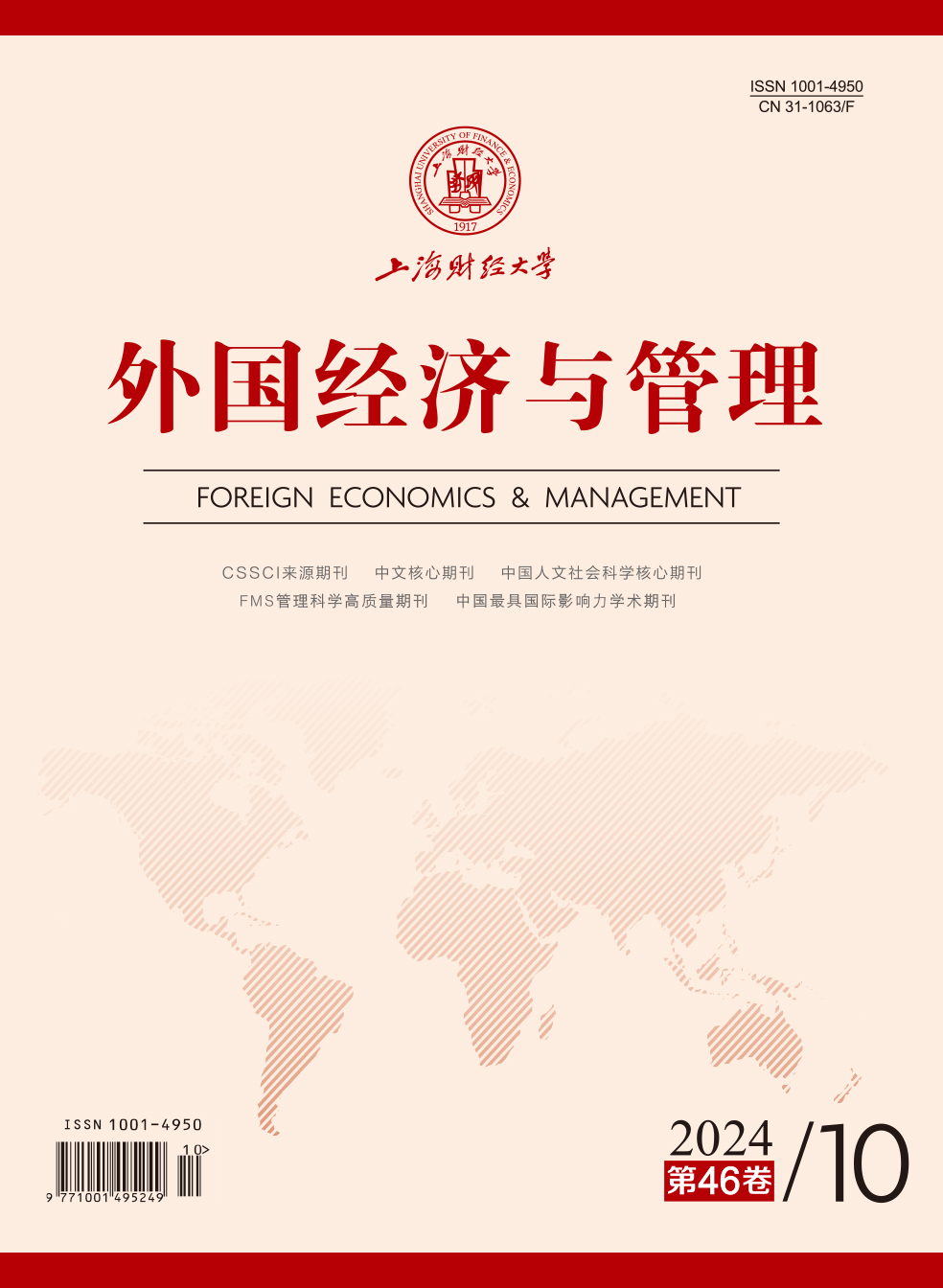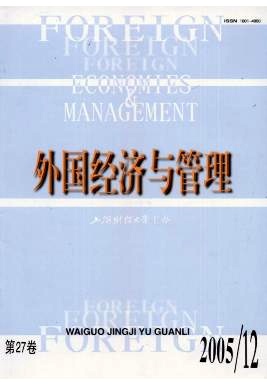德鲁克管理学方法论述评——兼悼念管理大师彼得·F.德鲁克
外国经济与管理 2005 年 第 27 卷第 12 期, 页码:2 - 11
摘要
参考文献
[1]Richard P Rumelt,Dan Schendel and David J Teece.Strategic management and economics[J].Strategic ManagementJournal,1991,12(SI):5-29.
[2]Cynthia A Montgomery.Of diamonds and rust:a new look at resources[A].In C A Montgomery,eds.Resource-basedand evolutionary theories of the firm[C].Massachusetts:Kluwer-Academic Publishers,1995:251-268.
[3]Alfred P Sloan Jr.My years with general motors[M].New York:Doubleday,1963.
[4]Peter F Drucker.The Future of industrial man[M].New York:John Day,1942.
[5]Raza Mir and Andrew Wastson.Strategic management and philosophy of science:the cases for a constructivist methodology[J].Strategic Management Journal,2000,21(9):941-953.
[6]Peter F Drucker.The Practice of management[M].New York:Harper&Row Press,1954:ch.5.
[7]Peter F Drucker.Management challenges for the 2lst century[M].New York:Harper Press,1999.
[8]Joseph Alois Schumpeter.Business cycles:a theoretical historical and statistical analysis of the capitalist process[M].New York:McGraw Hill,1939,vol.2.
[9]Richard Cantillon.Essai sur la nature du commerce en general(1755)(Translated by Henry Higgs)[M].New York:Au-gustus Kelley,1964.
[10]Peter F Drucker.The new paradigm in management[J].Forbes,1998,10(5).
[11]Colin Campbell-Hunt.What have we learned about generic competitive strategy?a meta-analysis[J].Strategic Manage-ment Journal,2000,21(2):127-154.
[12]张钢.战略管理研究基础的建构论重构是否可能[J].自然辩证法通讯,2000,23(4):43-52.
[13]Peter Clark.Organisations in action:competition between context[M].London and New York:Routledge,2000:301.
[14]托马斯.S.库恩著;纪树生等译.必要的张力.[M].福州:福建人民出版社,1981:291.
[15]Franck Blackler.Knowledge,knowledge work and organization:an overview and interpretation[J].Organization Stud-ies,1995,16(6):1021-1046.
[16]Jean Lave&Etienne Wenger.Situated learning,legitimate peripheral participation[M].Cambridge:Cambridge Univer-sity Press,1991:138.
[17]Peter F Drucker.Post-capitalist society[M].New York:Harper Business,1993.
[18]Peter F Drucker.The Coming of new organizations[J].Harvard Business Review,1988,66(1/2):45-53.
[19]Michael Polanyi.Personal knowledge:towards a post-critical philosophy[M].New York:Harper Torchbooks,1962.
[20]Henry Mintzberg.Structure of organizations[M].New Jersey:Prentice-Hall,1979.
[21]Mashiko Aoki.Information,incentives and bargaining in the Japanese economy[M].Cambridge:Cambridge UniversityPress,1988.
[22]Ikujiro Nonaka and Hirotaka Takeuchi.The knowledge creating company:how Japanese companies create the dynamicsof innovation[M].New York:Oxford University Press,1995.
[23]Ikujiro Nonaka.The knowledge-creating company[J].Harvard Business Review,l991,69(11/12):96-104.
[24]Armand Hatchuel,and Benoit Weil.Expert in organization,a knowledge-based perspective on organizational change(Translated by L.Librecht)[M].Berlin:Walter de Gruyter,1995:222.
[25]Armand Hatchuel.The two pillars of new management research[J].British Journal of Management,2001,12(SI):33-39.
[26]卡尔.R.波普尔.猜想与反驳[M].上海:上海译文出版社,1986.
[27]A Seth and G Zinkham.Strategy and the research process:a comment.[J].Strategic Management Journal,1991,12(10):75-82.
[28]Peter F Drucker.Management challenges for the 21st century[M].New York:Harper Press,1999.
①注意:实践共同体与托马斯.S.库恩(1962)的科学共同体(scientific community)有所不同,库恩的科学共同体是指具有同一研究兴趣的学者,一般不包括实际工作者。在库恩看来,不管在实际生活中,还是在认知逻辑上,范式都意味着共同体成员围绕着特定学科或专业领域建立起来的共同信念、共同取向和共同的研究范畴。参见本文参考文献[14]。
②托马斯.S.库恩用的是“在使用中不断构造”的说法,而组织行为学的主要代表人物美国哈佛大学教育学和组织行为学詹姆斯.B.科南特讲座教授克里斯.阿吉里斯(Chris Argyris)用的是“使用中的理论”这个词,两者具有异曲同工之妙。参见:Thomas S.Kuhn(1962/1970).The Structure of Scientific Revolutions(2nd Edition)[M].Chicago:The University ofChicago Press,1970.
[2]Cynthia A Montgomery.Of diamonds and rust:a new look at resources[A].In C A Montgomery,eds.Resource-basedand evolutionary theories of the firm[C].Massachusetts:Kluwer-Academic Publishers,1995:251-268.
[3]Alfred P Sloan Jr.My years with general motors[M].New York:Doubleday,1963.
[4]Peter F Drucker.The Future of industrial man[M].New York:John Day,1942.
[5]Raza Mir and Andrew Wastson.Strategic management and philosophy of science:the cases for a constructivist methodology[J].Strategic Management Journal,2000,21(9):941-953.
[6]Peter F Drucker.The Practice of management[M].New York:Harper&Row Press,1954:ch.5.
[7]Peter F Drucker.Management challenges for the 2lst century[M].New York:Harper Press,1999.
[8]Joseph Alois Schumpeter.Business cycles:a theoretical historical and statistical analysis of the capitalist process[M].New York:McGraw Hill,1939,vol.2.
[9]Richard Cantillon.Essai sur la nature du commerce en general(1755)(Translated by Henry Higgs)[M].New York:Au-gustus Kelley,1964.
[10]Peter F Drucker.The new paradigm in management[J].Forbes,1998,10(5).
[11]Colin Campbell-Hunt.What have we learned about generic competitive strategy?a meta-analysis[J].Strategic Manage-ment Journal,2000,21(2):127-154.
[12]张钢.战略管理研究基础的建构论重构是否可能[J].自然辩证法通讯,2000,23(4):43-52.
[13]Peter Clark.Organisations in action:competition between context[M].London and New York:Routledge,2000:301.
[14]托马斯.S.库恩著;纪树生等译.必要的张力.[M].福州:福建人民出版社,1981:291.
[15]Franck Blackler.Knowledge,knowledge work and organization:an overview and interpretation[J].Organization Stud-ies,1995,16(6):1021-1046.
[16]Jean Lave&Etienne Wenger.Situated learning,legitimate peripheral participation[M].Cambridge:Cambridge Univer-sity Press,1991:138.
[17]Peter F Drucker.Post-capitalist society[M].New York:Harper Business,1993.
[18]Peter F Drucker.The Coming of new organizations[J].Harvard Business Review,1988,66(1/2):45-53.
[19]Michael Polanyi.Personal knowledge:towards a post-critical philosophy[M].New York:Harper Torchbooks,1962.
[20]Henry Mintzberg.Structure of organizations[M].New Jersey:Prentice-Hall,1979.
[21]Mashiko Aoki.Information,incentives and bargaining in the Japanese economy[M].Cambridge:Cambridge UniversityPress,1988.
[22]Ikujiro Nonaka and Hirotaka Takeuchi.The knowledge creating company:how Japanese companies create the dynamicsof innovation[M].New York:Oxford University Press,1995.
[23]Ikujiro Nonaka.The knowledge-creating company[J].Harvard Business Review,l991,69(11/12):96-104.
[24]Armand Hatchuel,and Benoit Weil.Expert in organization,a knowledge-based perspective on organizational change(Translated by L.Librecht)[M].Berlin:Walter de Gruyter,1995:222.
[25]Armand Hatchuel.The two pillars of new management research[J].British Journal of Management,2001,12(SI):33-39.
[26]卡尔.R.波普尔.猜想与反驳[M].上海:上海译文出版社,1986.
[27]A Seth and G Zinkham.Strategy and the research process:a comment.[J].Strategic Management Journal,1991,12(10):75-82.
[28]Peter F Drucker.Management challenges for the 21st century[M].New York:Harper Press,1999.
①注意:实践共同体与托马斯.S.库恩(1962)的科学共同体(scientific community)有所不同,库恩的科学共同体是指具有同一研究兴趣的学者,一般不包括实际工作者。在库恩看来,不管在实际生活中,还是在认知逻辑上,范式都意味着共同体成员围绕着特定学科或专业领域建立起来的共同信念、共同取向和共同的研究范畴。参见本文参考文献[14]。
②托马斯.S.库恩用的是“在使用中不断构造”的说法,而组织行为学的主要代表人物美国哈佛大学教育学和组织行为学詹姆斯.B.科南特讲座教授克里斯.阿吉里斯(Chris Argyris)用的是“使用中的理论”这个词,两者具有异曲同工之妙。参见:Thomas S.Kuhn(1962/1970).The Structure of Scientific Revolutions(2nd Edition)[M].Chicago:The University ofChicago Press,1970.
引用本文
罗珉. 德鲁克管理学方法论述评——兼悼念管理大师彼得·F.德鲁克[J]. 外国经济与管理, 2005, 27(12): 2–11.
导出参考文献,格式为:
上一篇:内部评级系统验证方法研究评介
下一篇:国外产业融合研究新进展





 5347
5347  0
0

